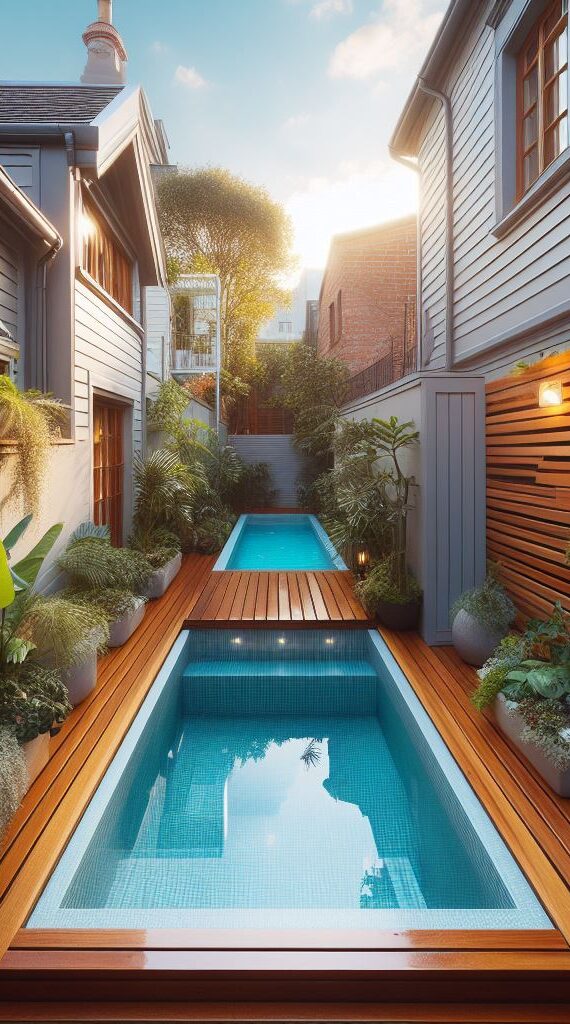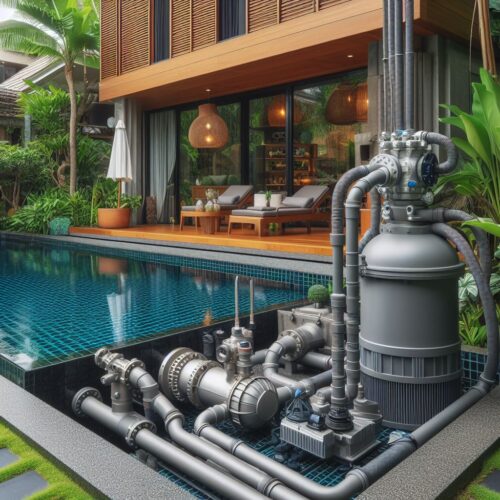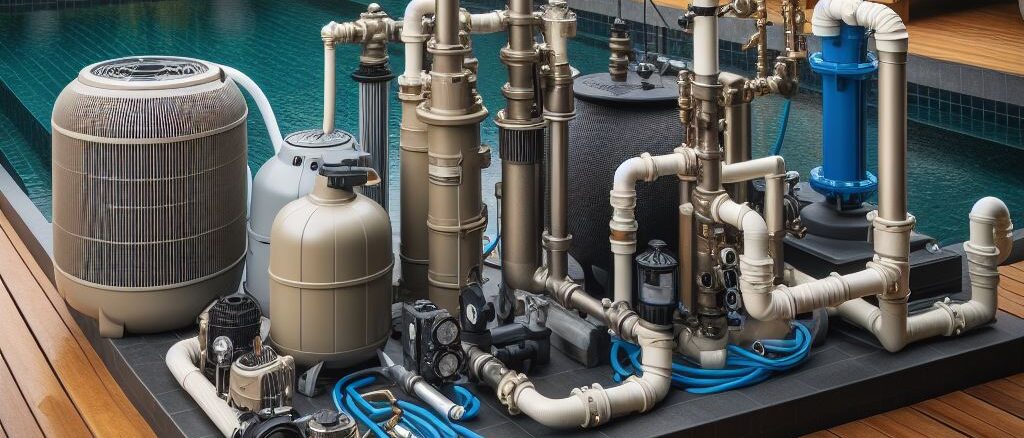How Long Should I Run My Pool Equipment?
In this comprehensive guide, we’ll dive deep into pool equipment operation to help you simplify your maintenance routines, save on energy costs, and keep that water crystal clear.
Whether you’re a pool enthusiast looking to master the art of DIY pool management or a meticulous homeowner seeking to become an expert in aquatic stewardship, this post is tailor-made just for you.
Let’s dive in!
Factors to Consider:
Before delving into specific run times, understand that a pool is influenced by various external and internal forces.
Unique characteristics, usage patterns, and environmental context all dictate pool equipment operation.
Pool Size and Volume: Size Matters! 🙂
When it comes to your pool, the size and water volume are super important.
Just keep in mind that larger pools take a little longer to filter through gravity, while smaller ones get the job done quicker.
Climate and Weather Conditions:
Weather patterns can have a big impact on your pool.
When it’s hot outside and more people are swimming, you might need to do some extra filtration to keep the water clean.
On the other hand, when it’s colder out and the pool isn’t used as much, you might not need to worry as much about contaminants.
Pool Usage and Activity Levels
If you love having your family and guests over for a swim, you know how quickly things can get messy in your pool.
With every splash, your pool collects debris, oils, and other stuff that can clog up your filtration system.
But don’t worry, keeping your pool clean is easy! Just make sure to give it a little extra TLC and check the filter regularly.
This way, you can enjoy a sparkling pool all year long!
Filtration System Efficiency
An efficient and appropriately sized filtration system can drastically change the recommended run times for your pool equipment.
Advanced filters like cartridge or DE filters can really make a difference.
They work super efficiently and can help you save time by adjusting the overall run time.
Pump Run Time
The pump is the heart of your pool’s circulatory system. It sends water through the skimmer, the main drain, and then through the filter before distributing the freshly cleansed water back into the pool.
Get A Total Pool & Hot Tub Course Bundle!Get all four pool and hot tub courses including The Pool Care Video Course, The Hot Tub Video Course, Money-Saving Guide for Pool Owners, and the Pool Winterization Course for one low price!
Recommended Hours of Pump Operation per Day
A common rule of thumb is to have the pump running for at least 8 hours a day.
This duration typically ensures that all the pool water cycles through the filter multiple times, maintaining chemical balance and water clarity.
Just a quick reminder to keep your pool equipment running smoothly by regularly cleaning your pump’s skimmer basket.
The frequency of cleaning can vary depending on how much debris is in your pool, so be sure to adjust accordingly!
Adjusting Run Time Based on Pool Usage and Seasonality
Heavy pool usage or warmer seasons may necessitate an extended pump run time — up to 12 hours or more.
Conversely, in the off-season, or during cooler weather when the pool isn’t used as often, you can dial back to the minimum.
Energy-Saving Strategies for Pump Operation
Implementing a variable speed pump can revolutionize your energy consumption.
These pumps adjust their speed based on the required flow rate, offering significant savings over traditional single-speed models.
Filter Run Time
Your pool’s filter is the ultimate garbage collector, capturing microscopic particles and contaminants.
But for how long must it dutifully clean?
Determining the Optimal Duration for Filter Operation
In conjunction with the pump, the filter should ideally be in operation for the same duration as the pump, ensuring that the water is consistently cleaned.
This might mean running the filter for 8 to 12 hours on a typical day.
Balancing Water Clarity and Energy Efficiency
Energy efficiency is crucial, but so is maintaining clear and safe water.
It’s a delicate balance, and you’ll often find yourself adjusting the filter run time in response to changes in pool usage and conditions.
Backwashing and Maintenance Considerations
Every now and then, backwash your filter to clean out the trapped debris and restore its efficiency.
Regular maintenance tasks like this might call for temporary upticks in your filter’s run time.
Additional Equipment Run Time
Other auxiliary pieces of equipment, such as pool cleaners and heaters, also require their share of the spotlight in your pool’s performance.
Check Out Our Amazon Storefront!
Duration for Running Pool Cleaners, Heaters, and Other Equipment
Different devices have different requirements when it comes to their run time.
For pool cleaners, the amount of time they need to run depends on the size of the pool and how dirty it is.
A larger pool or a pool with a lot of debris will require a longer run time. Typically, a few hours should be enough for most pools.
On the other hand, heaters need to run according to a set temperature schedule.
The run time for heaters will depend on the desired temperature and the outside temperature.
During colder months, the heater will need to run longer to maintain a comfortable temperature in the pool.
It’s important to keep in mind that running the heater for too long can be costly, so it’s essential to find the right balance between comfort and economy.
Energy-Saving Tips for Auxiliary Equipment
Ensure that these devices are well-maintained, and when not in use, switch them off to conserve energy.
Consider investing in energy-efficient models to reduce long-term operational costs.
Signs of Inadequate or Excessive Run Time
Inadequate run times will result in dirty water and an increased need for chemical intervention.
Excessive run times, on the other hand, are energy-inefficient and can lead to unnecessary wear and tear on your equipment.
Adjusting Run Time Based on Water Quality and Condition
When you notice signs of trouble, it’s time to act.
Increase operation to clear the water, and then monitor to determine if the extended run time should become the norm or a temporary measure.
Conclusion
Do you know that finding the right run time for your pool equipment is just like riding the perfect wave?
It requires a little bit of skill, timing, and environmental harmony.
But don’t worry, understanding how your pool works and taking good care of your equipment not only prolongs its lifespan but also keeps your swimming experience a source of ultimate joy!
Remember, every pool is unique, and the advice here is a starting point, not a finish line.
Regular maintenance, observant care, and a willingness to adapt to changing conditions are the true hallmarks of a seasoned pool owner.
If you’re feeling unsure about the depth of the water, don’t worry! Just reach out to a pool maintenance service for help.
They’ll be happy to offer you personalized advice based on your unique aquatic situation.
Don’t hesitate to ask for help – we all need a little assistance sometimes!
In the end, a well-operated pool is more than a slice of luxury in your backyard; it’s a reflection of the attention and care you invest in every aspect of your home.
Keep swimming, keep learning, and above all, enjoy every tranquil moment and every spirited splash in the pool whose waters you’ve come to know so well.
Now, the call is yours — let the poolside saga begin.
We’d love to hear from you about your experience with your pool equipment.
Can you share with us what the average running time of your pool equipment is?
Our community would greatly appreciate it!
We want to extend our gratitude to all our readers who have spent their time exploring this guide.
Your dedication to learning and maintaining your pool truly makes a difference.
We hope you found this information valuable and that it will simplify your pool maintenance journey.
“Full transparency: Our website features affiliate links. If you make a purchase through these links, we’ll earn a modest commission at no additional cost to you. This is an effortless way to support our commitment to delivering top-notch content.”



